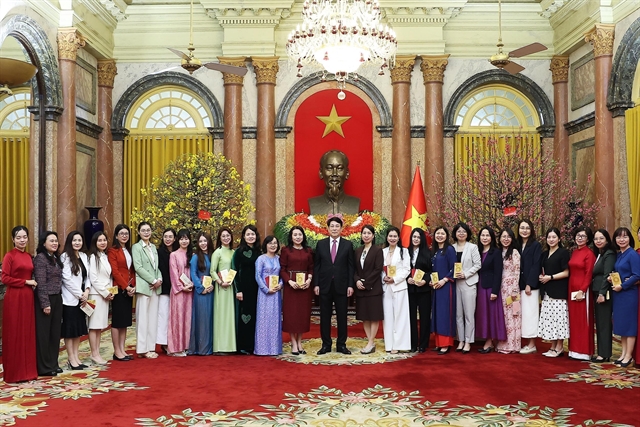 Sunday/Weekend
Sunday/Weekend

Em Là Bà Nội Của Anh (Sweet 20) earned more than VNĐ110 billion (US$4.9 million) after two months of nationwide screening, making it the highest-grossing Vietnamese movie last year.
 |
INNER SANCTUM
Em Là Bà Nội Của Anh (Sweet 20) earned more than VNĐ110 billion (US$4.9 million) after two months of nationwide screening, making it the highest-grossing Vietnamese movie last year.
Directed by first-time feature director Phan Gia Nhật Linh, the fantasy movie follows the adventures of a cranky old lady who is magically transformed into her 20-year-old self, with a talent for singing.
The movie was among six Vietnamese movies screened at Osaka Asian Film Festival 2016 in March.
Inner Sanctum interviews director Nhật Linh about his first motion picture.
Did you imagine Sweet 20 would be this successful when you made it?
A successful movie is one that touches the audience’s hearts, making them laugh or cry. Sweet 20 inspires audiences as they consider their dreams and makes them love their own families much more. The audience members see themselves and others around them as they truly are.
I think if viewers enjoy a movie they will naturally spread the word. I know many people have watched Sweet 20 several times, not only alone but also with their families.
It has been a very long time since we have seen a Vietnamese movie that is suitable for all ages.
I can say that Sweet 20 satisfied audiences by playing on different emotions. They recognise their own dreams through the movie.
Sweet 20 was screened at Osaka Asian Film Festival 2016, but it is not qualified to compete at the annual Việt Nam Cinematography Association’s Golden Kite Award. What are your thoughts on the two opportunities?
Sweet 20 and five others, Big Father, Small Father and Other Stories; Flapping in the Middle of Nowhere; The Lady Assassin; Super X; and Yellow Flowers on the Green Grass, are being screened at the Osaka Asian Film Festival’s Vietnamese Cinema in Bloom programme.
Of note is the fact that Sweet 20 will attend other global film festivals as well, but I think this is not the right time to talk about that in detail.
Sweet 20 is not qualified for the Golden Kite Award. That doesn’t matter to me because I think the award selection is done by a group of professionals. I don’t belong to that group, so I’m not interested in the award.
At first, one representative from the cinema association had called the Sweet 20 producers to invite them to compete for the award. But he later informed them that Sweet 20 was not qualified for the award since it is a remake of a South Korean production.
I feel bad for my actors who will not have the chance to compete for the award.
However, the actors have told me that they have no regrets. That makes me feel better.
Sweet 20 won the hearts of audiences in Việt Nam, and it will take part in international film festivals. That’s enough.
I watched your movie twice, and I liked it very much. It is a Korean remake, but it’s also familiar to the Vietnamese. Did you have difficulties aligning the story with the Vietnamese lifestyle?
No, I did not. When I agreed to make Sweet 20, I did not think of it as a remake of a Korean hit or that I would have to make it fit the Vietnamese lifestyle. I’m only interested in making films from my own emotions.
It was not too difficult for me because the story of Sweet 20 is very familiar to my family. I think the important thing is to make a good movie.
Sweet 20 enchanted audiences with songs by late musician Trịnh Công Sơn, a very well known and beloved musician in Việt Nam. Why did you choose these songs for the movie?
Honestly, I rarely listen to Vietnamese music. But it is very interesting because both my first television debut and Sweet 20, my debut motion picture, use a Vietnamese music score. I was greatly inspired by some of Trịnh Công Sơn’s songs. I liked them very much before I made the movie.
The song Con Tuổi Nào Cho Em in the movie came to me by chance. When I wrote the script depicting a known female singer remininscing about her glory days in her youth, that song kept playing in my mind.
The song is performed by the lead character, producing an excellent effect.
I also want to note that Trịnh Công Sơn’s family watched the movie and liked it very much. That makes me happy.
You said once, “I don’t earn money through filmmaking. I want to make films that convey a message to the audience.” Is that why you have waited until now to release your debut motion picture, even though you finished studying filmmaking in the United States many years ago?
Making a film is very expensive and requires a lot of labour. Before making a film, I always ask myself why I really want to make that film.
I don’t think directing films is a good way to earn a lot of money. I’d rather do other types of work than make a film for money.
I do many jobs related to filmmaking, such as shooting, scriptwriting, directing assistants and filming advertisements.
The success of Sweet 20 has given me the freedom to do what I like for the next few years. At present, I’m working on my next movie. I don’t like haste. I want to spend time on the filmmaking process to produce a great movie. — VNS




